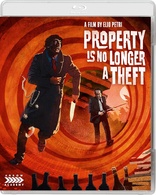Property Is No Longer a Theft Blu-ray Movie 
La proprietà non è più un furto / Blu-ray + DVDArrow | 1973 | 120 min | Not rated | Mar 28, 2017
Movie rating
|
| 6.8 | / 10 |
Blu-ray rating
| Users | 0.0 | |
| Reviewer | 3.5 | |
| Overall | 3.5 |
Overview click to collapse contents
Property Is No Longer a Theft (1973)
Total, a young bank cashier, has been wondering for some time if his life, with its grey, dismal prospect, is worth living. He is aware of the illicit careers and rise to riches of many of his clients. He decide to start a new life : new clothes, new cars, new women. His "new look" begins discreetly, a few small robberies in supermarkets, progressing to more important fraud.
Starring: Flavio Bucci, Ugo Tognazzi, Daria Nicolodi, Mario Scaccia, Orazio OrlandoDirector: Elio Petri
| Foreign | Uncertain |
| Drama | Uncertain |
| Comedy | Uncertain |
| Crime | Uncertain |
Specifications click to expand contents
Video
Video codec: MPEG-4 AVC
Video resolution: 1080p
Aspect ratio: 1.85:1
Original aspect ratio: 1.85:1
Audio
Italian: LPCM 2.0
Subtitles
English
Discs
Blu-ray Disc
Two-disc set (1 BD, 1 DVD)
DVD copy
Playback
Region A, B (C untested)
Review click to expand contents
Rating summary
| Movie | 3.5 | |
| Video | 4.5 | |
| Audio | 4.0 | |
| Extras | 2.5 | |
| Overall | 3.5 |
Property Is No Longer a Theft Blu-ray Movie Review
Petri's dish.
Reviewed by Jeffrey Kauffman April 15, 2017According to the always questionably reliable internet, there are a grand total of five Communist nations left in the world, North Korea, Cuba, Laos, Vietnam and the “big kahuna” China. That might be evidence enough that Karl Marx’s economic theory is not exactly catching fire or (perhaps more saliently) maintaining heat as time marches onward, but it also doesn’t mean that Capitalism is above reproach, as Elio Petri’s 1973 semi-screed like comedy Property Is No Longer a Theft ably demonstrates. The film begins with a rather arresting audio montage of the verb “to have” being conjugated. It’s an instant grammatical analysis of what Petri senses is the foundational basis of western economic theory: possession. That in turn leads to a corollary thesis that springs from the very act of having, namely that some people are going to end up having more than others, which of course leads to the third leg of this Capitalist stool—envy. An accountant rather cheekily named Mr. Total (Flavio Bucci) begins the film with a short monologue (one of several for different characters scattered throughout the film) where he discusses some of these concepts. When the film settles into its somewhat uneasy narrative path, it turns out Total is a clerk at a bank, tasked with handling money that he is actually allergic to, in just one of many little throwaway items in Property Is No Longer a Theft which may raise eyebrows of some budding psychoanalysts. Total’s itchy twitchy presence is an embarrassment to several of his coworkers, who urge him not to scratch in public and to refrain from wearing his weirdly fingerless gloves (if you had to handle bills which made you itch, wouldn’t you want your gloves to have fingers?). Total’s emotional despair isn’t limited to his allergies, for he is of course witness to untold amounts of cold hard cash passing under his nose all day long, not to mention the nonchalant arrogance of such well to do folks as a local butcher (Ugo Tognazzi) who regularly gifts the tellers at Total’s workplace with prime cuts of meat.
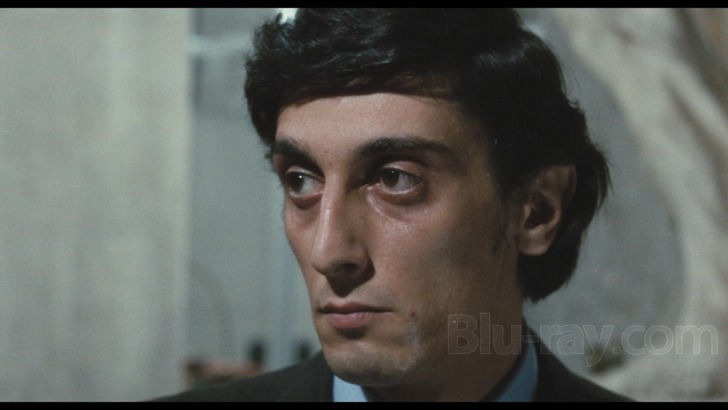
A somewhat confusing vignette documents a robbery at the bank which in some way includes the Butcher, who may have been forced to participate by a gang of masked thieves (this particular plot point simply wasn’t clear to me). This brazen act seems to spark something in Total, who is already unhappy and who isn’t particularly swayed by advice proffered to him by his father (Salvo Randone), who basically asserts that virtue is its own reward. For reasons which are also not overly detailed, Total focuses his guerrilla tactics on the Butcher, first stealing his knife and then his hat, before showing up at the Butcher’s luxurious flat to accost the Butcher’s girlfriend Anita (Daria Nicolodi) and making off with some booty. The Butcher, instead of being devastated by the theft, decides it’s the perfect time to commit insurance fraud, in a telling aside that Petri presents as merely further proof that the “haves” will never be satisfied until they have more.
In a way, Property Is No Longer a Theft develops some of the class conciousness ideas that were part and parcel of Petri’s immediately prior film to this one, La classe operaia va in paradiso (The Working Class Goes to Heaven), albeit within the context of a certain kind of mendacity which Petri seems to suggest is forced upon those who don’t “have enough” and who are seeking to better their lots in life, not always in virtuous ways. Part of Petri’s thesis seems to be that there are no ultimate winners in this enterprise, since the very act of having is in itself an example of moral turpitude.
Perhaps because I'm a near lifelong vegetarian, a quote emblazoned on the wall of the Butcher's shop instantly caught my attention. It proclaims "Man is a carnivorous animal", which is ironically (given what I'll be discussing in a moment vis a vis dialecticism) the antithesis of a famous quote by Henry David Thoreau, who is discussing another form of “possession”, namely the eating of meat:
Is it not a reproach that man is a carnivorous animal? True, he can and does live, in a great measure, by preying on other animals; but this is a miserable way - as anyone who will go to snaring rabbits, or slaughtering lambs, may learn - and he shall be regarded as a benefactor of his race who shall teach man to confine himself to a more innocent and wholesome diet. Whatever my own practice may be, I have no doubt that it is part of the destiny of the human race, in its gradual improvement, to leave off eating animals, as surely the savage tribes have left off eating each other when they came in contact with the more civilized.This quote is especially salient since the Butcher obviously makes his evidently extremely good living off of the desire to eat meat, and also by the fact that the Butcher’s shop restates Thoreau’s initial query as an inarguable assertion, thereby completely subverting its original context. I can't help but think this allusion is intentional, especially since if one takes Thoreau's critique of eating meat and generalizes it to any kind of unwise consumption, it becomes more or less exactly the same point that Petri is making.
Petri’s literary allusions also probably spread into this film’s subtext in other ways, including the film's very title, which is the antithesis of 19th century French anarchist Pierre Joseph Proudon's assertion that "La propriété, c'est le vol!" But there are other allusions as well, notably Petri's presentation of a dialectic which is frankly neither Hegelian nor traditionally Marxist. Total is obviously trading his “worker’s chains” for a different kind of slavery, but instead of a Hegelian synthesis, Petri suggests there’s really nothing this “process” arrives at other than entropy and, ultimately, self destruction. Property Is No Longer a Theft is often thought provoking, albeit in an almost Looney Tunes way at times, with Total’s efforts essaying a kind of cartoonish ambience, something that probably makes the film’s philosophical underpinnings more accessible but which perhaps keeps things feeling detached from “real life”.
Property Is No Longer a Theft Blu-ray Movie, Video Quality 
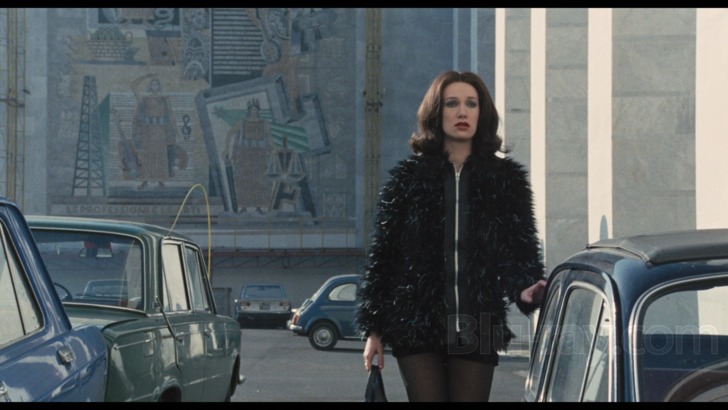
Property Is No Longer a Theft is presented on Blu-ray courtesy of Arrow Academy with an AVC encoded 1080p transfer in 1.85:1. Arrow's typically informative insert booklet contains the following information on the transfer:
Property Is No Longer a Theft was restored on behalf of The Museo Nazionale del Cinema, Torino and the Cineteca di Bologna from the original negative. The film was scanned at 4K resolution from the original camera negative and digitally restored in 2K resolution. The audio was sourced and restored from the optical negative. All restoration work was completed at L'Immagine Ritrovata, Bologna.This is a nicely organic looking presentation that has a somewhat thick but natural looking grain field and which offers very good detail levels, with an understanding that Petri's style in this film features a really peripatetic camera that is often shooting through or past items that often obscure at least part of the frame (see screenshot 17). The palette seems just a trifle cool to me, which may in fact be the way it looked when screened theatrically, but I found some elements like flesh tones to occasionally be a little wan or even drab. The film has a lot of dark segments, including the interstitial confessionals which play out almost entirely against and in black, and there are occasional very slight detail deficits that don't quite approach crush but which can fail to completely delineate subtle tonal differences in blacks.
Property Is No Longer a Theft Blu-ray Movie, Audio Quality 
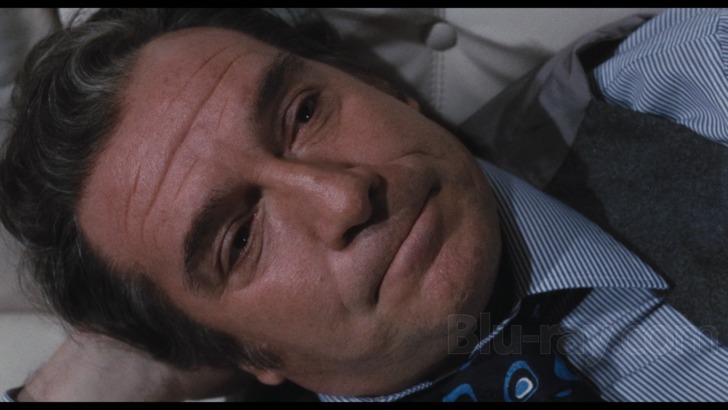
Property Is No Longer a Theft features a clear sounding LPCM 2.0 mono track in the original Italian. The film has a really interesting sound design at times, as evidenced by the aforementioned montage that starts things out, and that, coupled with a somewhat unusual score from Ennio Morricone, give this film some interesting sonics. I'm assuming this was post looped either entirely or in part, as is the Italian custom, since sync can sometimes be a little on the loose side. Otherwise, dialogue, effects and score are presented without any problems with very good fidelity.
Property Is No Longer a Theft Blu-ray Movie, Special Features and Extras 
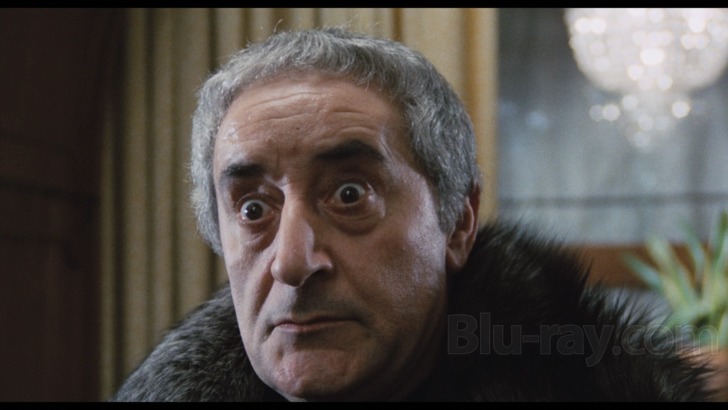
- My Name is Total (1080p; 19:46) is an appealing interview with Flavio Bucci, who portrays the scheming accountant in the film.
- The Middle Class Communist (1080p; 23:33) is an interview with producer Claudio Mancini.
- The Best Man (1080p; 23:04) features make-up artist Pierantonio Mecacci, who talks about his collaboration with Petri in general and this film in particular.
Property Is No Longer a Theft Blu-ray Movie, Overall Score and Recommendation 
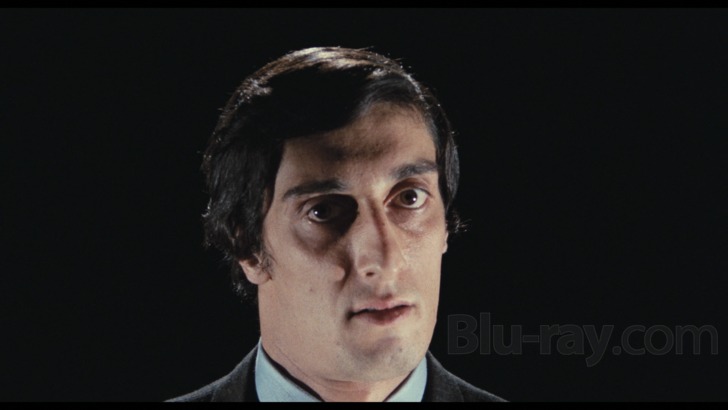
Property Is No Longer a Theft is a rather interesting film from a number of standpoints, one that has an undeniably cartoonish ambience but which is dealing in matters of almost epochal impact. The film's structure and writing is a little clunky at times, and its screed like tendencies may tend to make it off putting for some, but this analysis of what separates the "haves" from the "have nots" makes some fascinating and cogent points. Technical merits are strong and the supplementary package interesting. Recommended.
